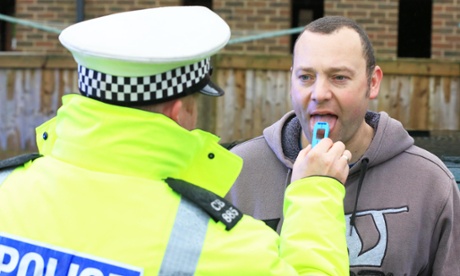
One of Britain’s biggest police forces, Greater Manchester, is to delay enforcing new legislation on drug driving when it comes into force.
Greater Manchester police (GMP) say they will not be charging suspects under the new law, which comes into force on Monday, and makes it illegal to drive with certain levels of illegal and prescription drugs in their bloodstream.
The new law is due to be enforced by new roadside drug testing kits that can detect traces of cannabis and cocaine in saliva. More traditional “field impairment tests” including measuring the size of a driver’s pupils or asking them to walk in a straight line can also be used.
“We have taken the decision, in GMP, not to make use of the legislation while we satisfy ourselves that the legal and procedural issues involved in prosecuting these cases can properly withstand legal scrutiny,” said Ch Insp Mark Dexley.
“This will be a temporary delay whilst we ensure our equipment has the right certification and our officers have the right training and understand the required procedures. We are mindful that if we get this wrong then a significant amount of court time and public money could be wasted.”
Other forces including the Metropolitan and the West Midlands will be enforcing the new drug-drive laws from Monday. But motoring lawyers have raised concerns that many drivers who are routinely prescribed therapeutic medication, such as morphine and temazepam, could find themselves caught by the new offence.
Alison Ashworth, head of motoring at Forster Dean solicitors, said: “Provided a person has been personally prescribed medication which they have taken, and have taken it in accordance with prescribing instructions and guidance, a defence will be available to them should they need to rely on it.”
Another motoring legal specialist, Damien Simmonds of JMW Solicitors, said the new law would create a specific limit for certain substances and warned that different enforcement approaches across the country could produce problems.
“Any lack of uniformity has the potential to create confusion in the minds of drivers about what police are entitled to ask of them and that could cause some motorists to refuse requests for saliva samples, especially during what may be an initial rush of roadside testing,” he said.
“If we’re not careful, that could lead to a number of motorists being charged with failure to provide specimens not because they have done anything wrong but due to their not being completely clear as to what the position is.”
The Department for Transport said it would be illegal in England and Wales to drive with certain illegal drugs in the blood, even if the driver is not unfit to drive.
It will be illegal to drive with certain levels of certain legal drugs if it makes the motorist unfit to drive. They include clonazepam, diazepam, flunitrazepam, lorazepam, methadone, and morphine or other opiate and opioid-based drugs. Penalties include a one-year driving ban, a £5,000 fine or up to 12 months in prison.
Chief Constable Suzette Davenport of the Association of Chief Police Officers said: “Every person who gets behind the wheel of a car under the influence of drugs is a danger to themselves and others. Improving the tools that officers can use to better detect those who drive whilst impaired by drugs will immeasurably enhance our ability to keep the roads safe.”
She said forces would be training their officers and making decisions locally about the best way to implement the new legislation, which would bolster existing measures rather than replace them. “As with drink-driving, our message remains the same: Don’t take the risk – it’s not worth it and you will be caught.”

